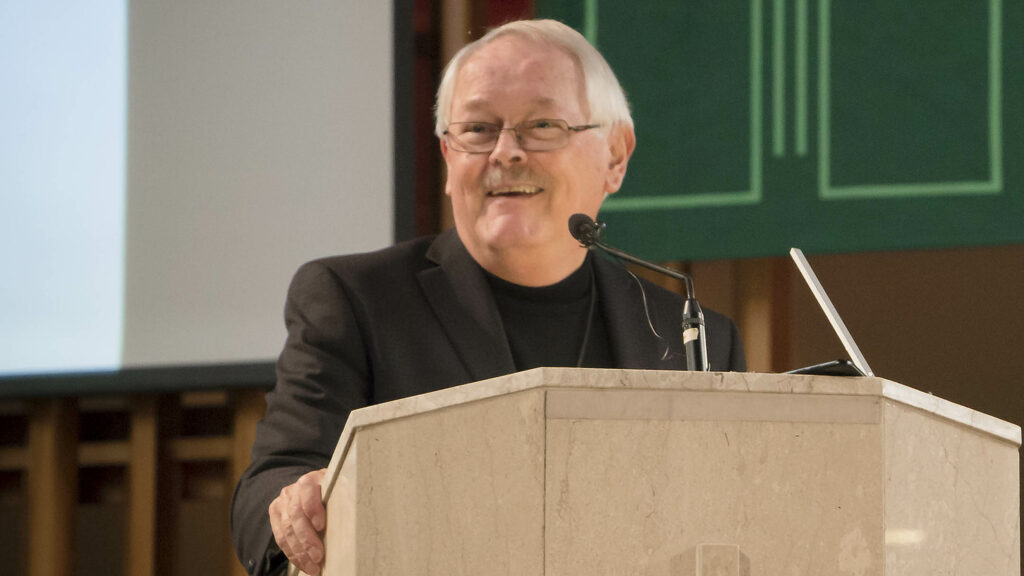What is the Eucharist? What is supposed to happen when we gather to celebrate the ritual that Jesus gave us at the Last Supper and asked us to perpetuate until his return? Is this meant to be a family meal or a re-enactment of Jesus’ sacrificial death? Is it meant to look like the old Latin mass or like it looks in most churches today?
There are no simple answers to these questions because there is no one theology (to the exclusion of all others) of the Eucharist, even in the New Testament. Rather there are various theologies of the Eucharist, complementary to be sure, but each emphasizing different aspects of a reality that is too rich to capture in a single concept. What is the Eucharist?
In essence, the Eucharist is a reality with these interpenetrating dimensions.
- The Eucharist is God’s physical embrace of us. Without the Eucharist, as Andre Dubus asserts, God becomes a monologue. The Eucharist is where God touches us physically. It is the place where God is still taking on physical flesh.
- The Eucharist is a meal we share together. The Last Supper was many things, but it was also a meal, a time of human fellowship, a celebration at table. So too for the Eucharist, it is many things, but it is also a table for a family to gather around, where joy can be shared and where it is safe to break down in sorrow.
- The Eucharist is an intensification of our union with each other inside the Body of Christ. As disciples of Jesus, we too constitute the Body of Christ. At a Eucharist, not just the bread and wine are meant to be changed into the body and blood of Christ, so too we, the people. That is why St. Augustine, when giving out communion, would sometimes say, “Receive what you are.”
- The Eucharist is a sacrifice. It is a making memorial (Zikkaron) of the saving event of Jesus’ death. In short, it is the Christian Passover supper. The Eucharistic prayer does not just ask God to change the bread and wine into the body and blood of Christ, it also asks God to make the saving event of Jesus’ death available for us to participate within today.
- The Eucharist is the new manna. Just as God fed his people in the desert with manna each day, so now, daily, God feeds his people with bread from heaven. (This motif is particularly strong in John’s Gospel.)
- The Eucharist is a vigil act. Jesus told us to celebrate the Eucharist so as to wait for his return. We celebrate Eucharist as a vigil. As Gerhard Lohfink puts it: “The early apostolic communities cannot be understood outside of the matrix of intense expectation. They were communities imminently awaiting Christ’s return. They gathered in Eucharist, among other reasons, to foster and sustain this awareness, namely, that they were living in wait, waiting for Christ’s return.” At the Eucharist, we meet with each other in vigil to stay awake for Jesus’ return.
- The Eucharist is a washing of each other’s feet. The Gospel of John does not mention bread and wine at the Last Supper; instead, where the other Evangelists and St. Paul highlight Jesus changing the bread and wine into his body and blood, John substitutes a basin and towel for the bread and wine. Why? Among other reasons, to teach that this kind of humble action towards each other, washing each other’s feet, is one of the major meanings of the Eucharist.
- The Eucharist is a prayer for the world, making Christ’s flesh food for the life of the world. It is a prayer for God’s help for the whole world. Akin to a “Quaker Silence”, it brings the helplessness of the world to God and asks God to do for it what it cannot do for itself -bring about peace and justice.
- The Eucharist is a sacrament of reconciliation and forgiveness. We go to Eucharist to have our sins forgiven, to be as sinners at table with Jesus.
- Finally, the Eucharist is the ultimate religious ritual through which we sustain ourselves in faith, discipleship, and community. We gather for Eucharist in order to stay alive. A Eucharist gathering is analogous to an Alcoholics’ Anonymous meeting. We gather because without this regular ritual gathering, our faith, discipleship, and community would eventually fall apart. In the words of Ronald Knox, the Eucharist is our one great act of fidelity to Jesus. Truth be told, we are not ever really faithful to the Gospels; we don’t love our enemies and don’t turn the other cheek, but we are faithful in one major way, we keep the Eucharist going – and that single act is going to save us.

